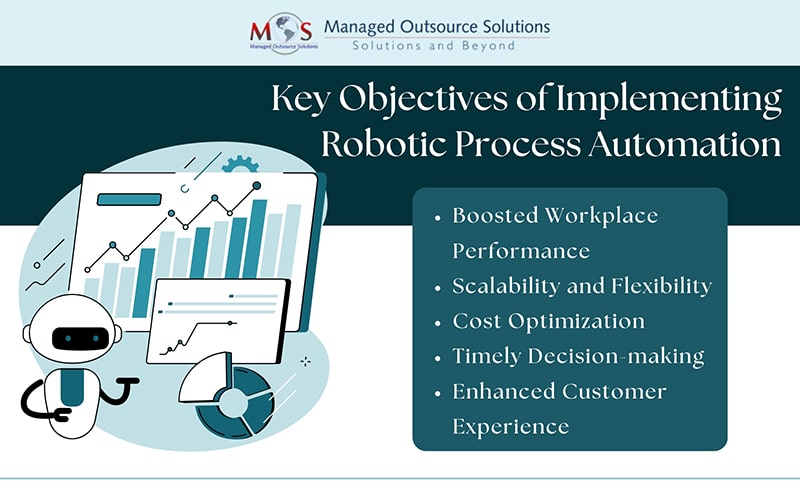In today’s fast-paced business world, efficiency and productivity are the driving forces behind the success of any organization. As the technology evolves to be more sophisticated, businesses leverage modern tools and AI-powered solutions to automate processes and gain a competitive edge. One innovative and agile technology that has emerged in recent times is Robotic Process Automation.
By employing RPA in business operations, companies can configure bots to perform repetitive and rule-based manual tasks. This enables businesses to work smarter, and not harder, as staff members are free to concentrate on valuable tasks rather than mundane and time-invasive processes. Businesses can partner with robotic process automation services to eliminate routine procedures, simplify workflows, and drive financial growth.
Understanding Robotic Process Automation
Robotic Process Automation, or RPA, refers to the use of software robots or “bots” to automate structured and repetitive processes that were previously performed by humans. These bots, powered by artificial intelligence (AI) and machine learning (ML), mimic human actions when interacting with applications and systems. They streamline business operations by learning and adapting to different, complex processes without the need for human intervention. Examples of repetitive tasks include:
- Data entry
- Invoice processing
- Business information extraction
- Inventory management
- Report generation
Unlike traditional automation tools, RPA does not require deep technical expertise to operate. Its low-code, user-friendly nature allows non-technical employees to design, execute, and monitor automated workflows, making it an accessible solution for businesses of all sizes. Implementing RPA is a strategic advantage, as it seamlessly integrates with existing software networks, enhancing accuracy, speed, and reducing human errors.
How to Identify Suitable Processes for RPA
Identifying suitable processes for RPA is essential, as not all business functions are equally effective for automation. RPA is most effective when applied for repetitive, high-volume, and rule-based processes. It is not appropriate for dynamic processes requiring complex decision making, human creativity, or unstructured data.
Below are the key criteria to identify tasks ideal for RPA in businesses:
- Repetitive, rule-based tasks: RPA excels in streamlining repetitive tasks that follow clear, predefined rules. These tasks are often time-consuming and susceptible to human mistakes. Examples include data entry, record maintenance, and order processing. Automating these tasks enhances efficiency and reduces mistakes.
- Transaction volume: Automation is particularly effective in processes that handle large volumes of data or transactions, helping businesses manage above-average demands. For instance, companies processing large numbers of sales orders or customer data can significantly benefit from RPA by speeding up operations while ensuring accuracy.
- Low-value tasks: Tedious administrative tasks that consume significant time but don’t add substantial value are common in many business functions. These tasks—such as filing documents, sorting emails, or responding to customer queries—can be automated. This allows employees to focus on more valuable, strategic activities that contribute to business growth.
- Compliance-driven: Many industries, such as healthcare and finance, face strict regulations that require consistency and integrity in data management. RPA can automate compliance-related processes, such as data audits, record-keeping, and regulatory reporting. This ensures that companies adhere to legal standards while minimizing compliance risks.
- High error rate: Automation is particularly beneficial for processes with a high incidence of human error. For example, tasks that involve manually transferring data between multiple systems or applications are prone to mistakes. RPA can automate these processes, reducing errors and increasing reliability.
By automating these processes, businesses can attain operational excellence, drive unmatched productivity, and respond swiftly to industry trends.
Why Do Enterprises Choose Robotic Process Automation?
As customer expectations, operational costs, and market complexity rise, companies must proactively maintain quality and consistency in their business operations. Robotic process automation enables businesses to optimize workflows, effectively allocate resources, and reduce manual errors. With ongoing technological advancements, automation opens up new avenues for business growth.
Here are the key reasons why organizations are increasingly adopting robotic process automation in their operations:
- Boosted Workplace Performance: Departments such as Human Resources (HR) often face high volumes of repetitive tasks that can cause delays and confusion. By deploying bots to handle these monotonous activities around the clock, employees can focus on higher-value and strategic roles. This not only improves operational efficiency but also enhances the overall performance of the company.
- Scalability and Flexibility: As businesses grow, the volume of mundane tasks increases, consuming valuable time and potentially compromising work quality. Automating these responsibilities allows organizations to scale operations effortlessly without the need for a proportional increase in manual labor, providing greater scalability and flexibility.
- Cost Optimization: Automating time-consuming processes helps businesses significantly lower operational costs, reduce labor expenses, and allocate resources more efficiently. These cost savings contribute to improved financial outcomes and better resource management.
- Timely Decision-making: Bots can automatically extract and analyze data, generating accurate reports with valuable insights that inform decision-making. In a competitive business environment, timely, data-driven decisions are crucial to respond to market trends and maintain an edge.
- Enhanced Customer Experience: In today’s crowded business landscape, brands must provide personalized and rapid customer service to stand out. Automating tasks such as order processing and customer inquiries leads to faster response times, ultimately improving customer satisfaction and fostering loyalty.
For businesses looking to achieve these advantages, partnering with an RPA company is the ideal choice to eliminate routine processes and concentrate on strategic activities.

Leverage Outsourcing to Implement RPA in Your Operations
As agility and innovation are key drivers of success in today’s business environment, companies aiming to achieve these goals can benefit from outsourced RPA services. Doing so allows organizations to unlock new levels of efficiency, accuracy, productivity, and scalability. These external services provide custom-tailored RPA solutions that address the unique needs of each organization, transforming business operations. They collaborate with business teams to design and deploy software bots that automate repetitive, time-consuming tasks. As a result, companies can minimize manual labor, maximize human resource utilization, and optimize processes. This facilitates better data analysis, enabling real-time insights and data-driven decision-making. With automated systems in place, businesses can stay competitive, ensure compliance, and achieve peak profitability.




